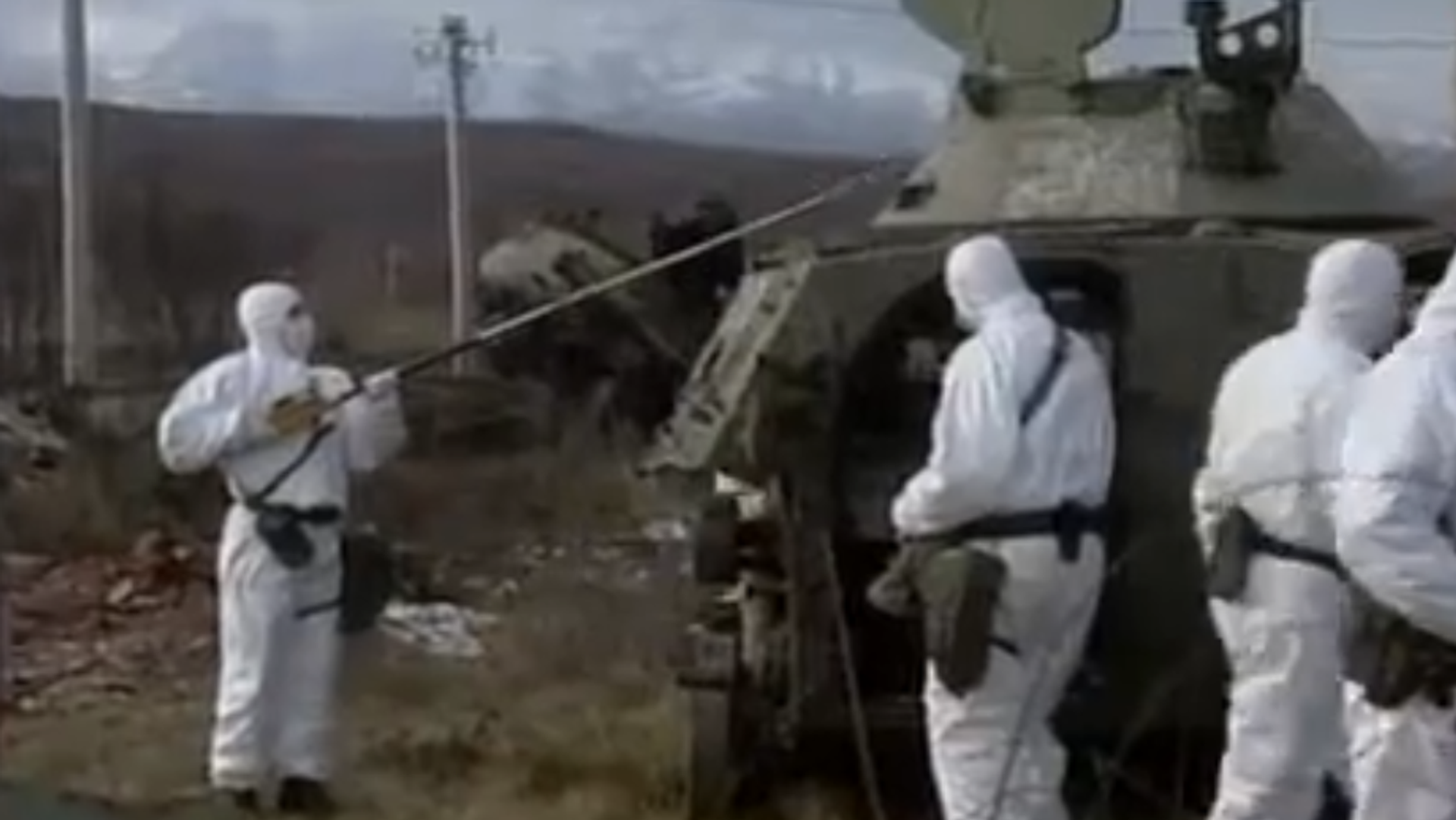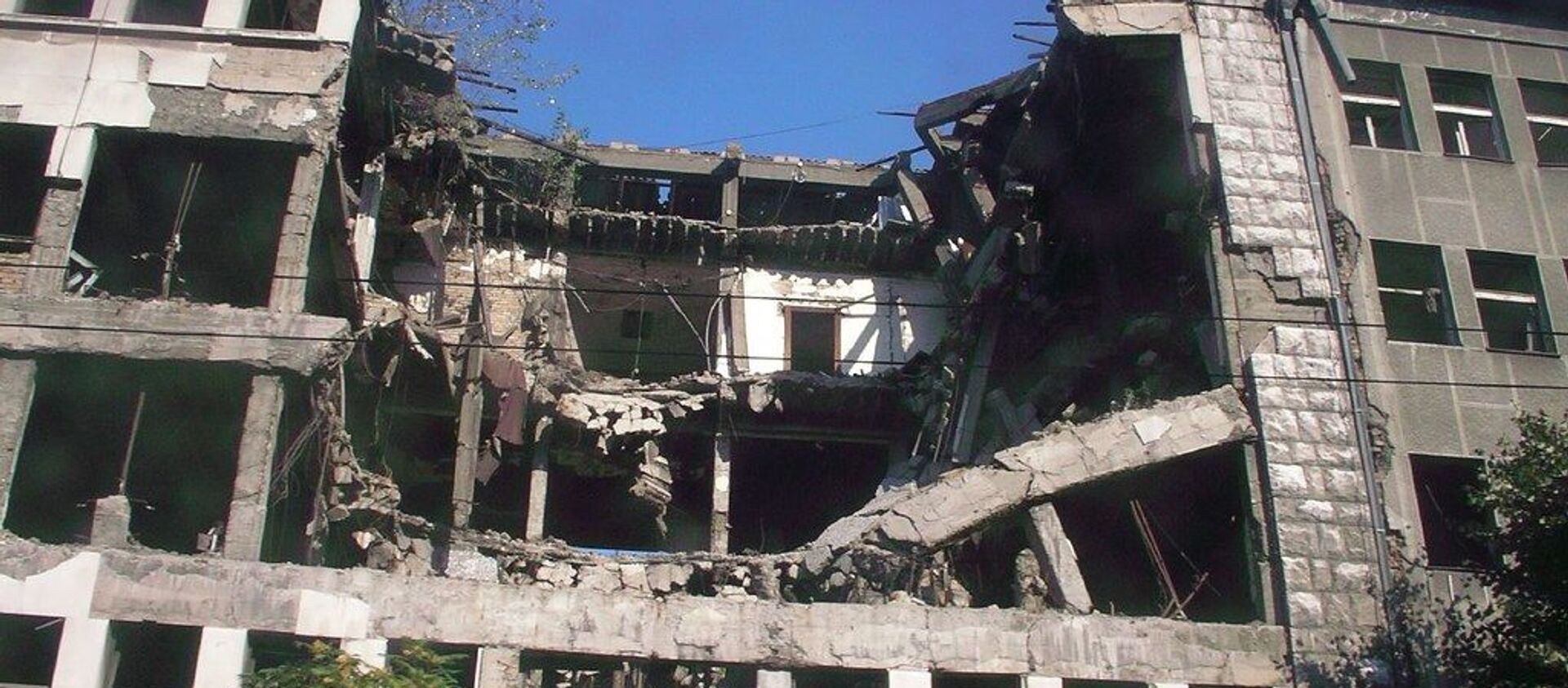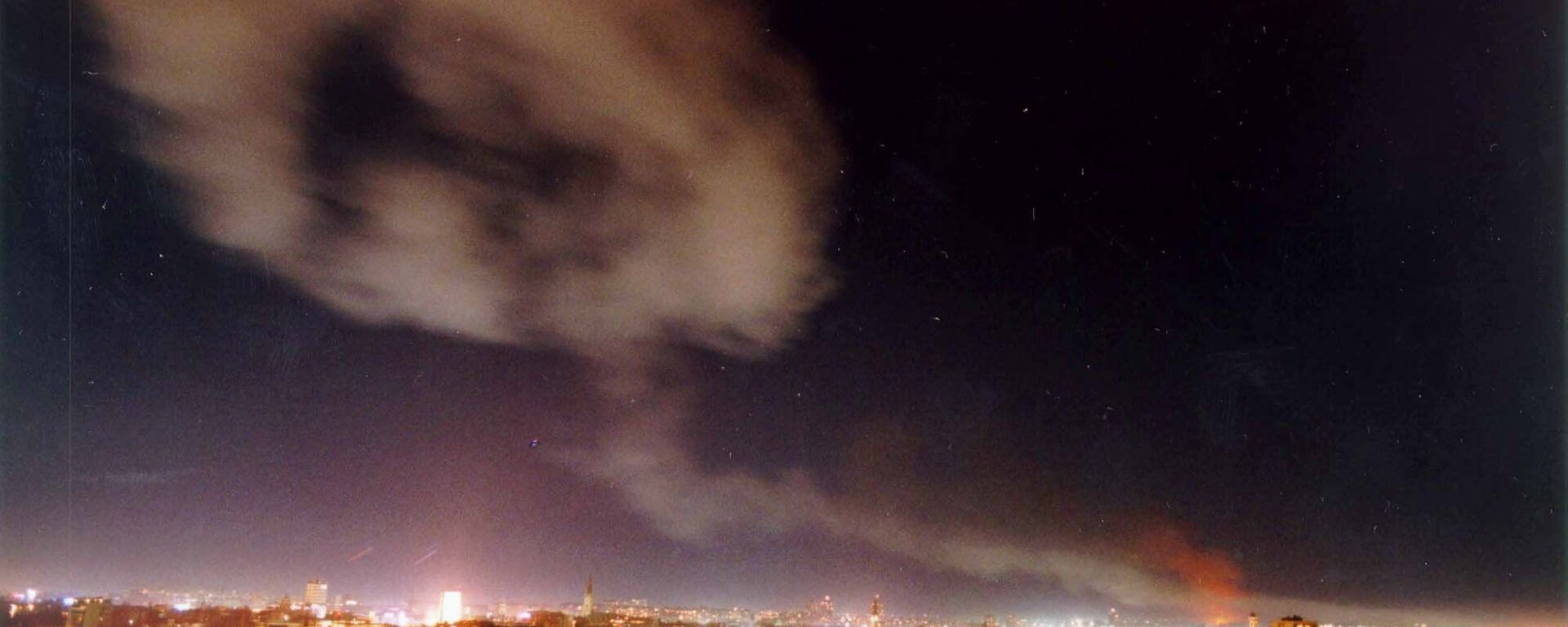https://sputnikglobe.com/20220723/serbs-bombed-by-nato-in-1999-show-levels-of-uranium-in-bloodstreams-hundreds-of-times-above-norm-1097728370.html
Serbs Bombed by NATO in 1999 Show Levels of Uranium in Bloodstreams Hundreds of Times Above Norm
Serbs Bombed by NATO in 1999 Show Levels of Uranium in Bloodstreams Hundreds of Times Above Norm
Sputnik International
The US and its allies spent 78 days bombing the now-dissolved nation of Yugoslavia in 1999, contaminating the Balkans with at least 15 tons of depleted uranium... 23.07.2022, Sputnik International
2022-07-23T15:50+0000
2022-07-23T15:50+0000
2022-07-23T16:03+0000
depleted uranium
america
serbia
yugoslavia
bombing
lawsuit
https://cdn1.img.sputnikglobe.com/img/07e6/07/17/1097728225_0:94:920:612_1920x0_80_0_0_5f943a9d93fbd9a9f6b0380c29c17933.png
Medical testing of a Serbian soldier and civilian who came under fire during the 1999 NATO bombings has found that the level of radioactive uranium in their bloodstreams is “hundreds of times” above the norm, Serbian attorney Srdan Aleksic has told Sputnik.Aleksic, who has spent several years filing lawsuits to try to ensure compensation for the victims of the DU bombings, said the testing was carried out in Turin, Italy, and that his legal team is now awaiting an official translation of the results into Serbian.“The second analysis was taken from a woman in Belgrade…Her results are a little better. We will file a lawsuit on the basis of the results,” he added. Serbian media indicated that the woman was exposed to DU after finding herself near the bombed out Ministry of Defense building in the Yugoslav capital in 1999.Turin-based forensic scientist Dr. Rita Celli, a DU analysis expert who assisted multiple Italian legal cases seeking compensation for Italian troops who fell ill or died following their exposure to the deadly substance, characterized the pair of Serbians’ test results as “dramatic.”Celli’s approach involves blood testing and biopsies, and a search for aluminum, barium, antimony, lead, molybdenum, and other metals.“All of the detected metals contain traces of U-238, which comes from the shells used by NATO during the bombing of Bosnia and Herzegovina and Serbia, and especially Kosovo and Metohija. Its effects have almost certainly also affected surrounding countries, such as Albania and Macedonia,” Celli told Serbian outlet Vecherne Novosti in an article published Saturday.Under normal conditions, Celli said, the maximum amount of aluminum in a liter of blood is 3.3 micrograms. But in Italian and Serbian troops suffering from DU contamination, it runs from 500, 2,000, or even 3,000 micrograms. Among civilians, the safe level of uranium is 0.0053 units per liter of blood, while among those who have been contaminated, it can reach up to 10 micrograms.Aleksic is working with Italian lawyer Andel Fiore Tartaglia, who has spent decades fighting for compensation for DU exposure suffered by Italian troops and their families, including among those who served in Kosovo during NATO’s ground-based occupation of the breakaway Serbian territory. In 2021, the lawyers filed a lawsuit in the High Court of Belgrade to demand that NATO provide financial for Serbian victims of the DU bombings.Hearings in the case are expected to begin in October, but NATO has already preemptively declared that the bloc has “full immunity” from prosecution under Serbian jurisdiction on the basis of agreements signed in 2005 and 2006.Aleksic told Sputnik Serbia earlier this year that the immunity claims are rubbish, since such immunity can’t be applied retroactively – i.e. to the 78-days which NATO spent bombing the country between March and June of 1999.Tartaglia similarly told Vecherne Novosti in its Saturday article that “there is no immunity for war crimes and the principle of retroactivity does not apply.”In 2000, a Belgrade court found former US General Wesley Clark and NATO chief Javier Solana guilty of war crimes for the 1999 bombings. However, the ruling was overturned in 2001 following the color revolutionary overthrow of Yugoslav President Slobodan Milosevic and his detention at The Hague, where he died in custody in 2006.Serbia suffers from one of the highest cancer rates in Europe, with close to 60,000 oncology diagnoses made each year, and cancers among children as much as two-and-a-half times above the European average. In the decades since the 1999 bombings, local doctors and scientists have also recorded an alarming rise in infertility, autoimmune diseases, and mental disorders.The NATO war machine has used DU munitions in many of its campaigns since the end of the Cold War, sowing up to 2,300 tons of DU across Iraq during the 1991 Gulf War and the 2003 invasion, and using the weapons in Afghanistan and Syria on a smaller scale. Military drills and accidents involving US aircraft are also said to have contaminated parts of Okinawa, Japan, Sardinia, Italy, and Remscheid, Germany.As many as 20 nations, including Russia, France, Japan, China, South Korea, and South Africa are confirmed or suspected of having depleted uranium tank shells, armor piercing bullets, and air-dropped projectiles in their arsenals, but the United States and Britain are the only two countries confirmed to have used the substance in combat. DU’s potential for use as a weapon was first discovered in the 1970s, and it has been integrated into projectiles – particularly anti-tank rounds, due to its incredible density, comparatively low aerodynamic drag, and ability to penetrate deeper into targets than conventional shells.
https://sputnikglobe.com/20200605/french-court-people-die-of-depleted-uranium-irradiation-in-kosovo-1079531665.html
https://sputnikglobe.com/20220525/nato-claims-immunity-to-serbian-lawsuit-on-use-of-depleted-uranium-in-1999-bombings-1095778023.html
https://sputnikglobe.com/20220321/over-1mln-iraqis-may-have-suffered-from-use-of-uranium-shells-by-us--1094060037.html
serbia
yugoslavia
Sputnik International
feedback@sputniknews.com
+74956456601
MIA „Rossiya Segodnya“
2022
News
en_EN
Sputnik International
feedback@sputniknews.com
+74956456601
MIA „Rossiya Segodnya“
Sputnik International
feedback@sputniknews.com
+74956456601
MIA „Rossiya Segodnya“
depleted uranium, america, serbia, yugoslavia, bombing, lawsuit
depleted uranium, america, serbia, yugoslavia, bombing, lawsuit
Serbs Bombed by NATO in 1999 Show Levels of Uranium in Bloodstreams Hundreds of Times Above Norm
15:50 GMT 23.07.2022 (Updated: 16:03 GMT 23.07.2022) The US and its allies spent 78 days bombing the now-dissolved nation of Yugoslavia in 1999, contaminating the Balkans with at least 15 tons of depleted uranium munitions. In the United States, troops who have been exposed to DU are eligible for generous disability benefits. Nothing of the kind has been offered to the people of Yugoslavia.
Medical testing of a Serbian soldier and civilian who came under fire during the 1999 NATO bombings has found that the level of radioactive uranium in their bloodstreams is “hundreds of times” above the norm, Serbian attorney Srdan Aleksic has told Sputnik.
Aleksic, who has spent several years filing lawsuits to try to ensure compensation for the victims of the DU bombings, said the testing was carried out in Turin, Italy, and that his legal team is now awaiting an official translation of the results into Serbian.
“So I will not delve into the medical details. But the results are frightening, not only for southern Serbia, Kosovo and Metohija and the ground-based security zone between them, where our first plaintiff served for 200 days,” Aleksic said.
“The second analysis was taken from a woman in Belgrade…Her results are a little better. We will file a lawsuit on the basis of the results,” he added. Serbian media indicated that the woman was exposed to DU after finding herself near the bombed out Ministry of Defense building in the Yugoslav capital in 1999.
Turin-based forensic scientist Dr. Rita Celli, a DU analysis expert who assisted multiple Italian legal cases seeking compensation for Italian troops who fell ill or died following their exposure to the deadly substance, characterized the pair of Serbians’ test results as “dramatic.”
She indicated that the levels of uranium-238 found in their tissue was as much as 500 times above normal, and that such high levels of DU contamination have not been established in any other civilians or military personnel that she knows of.
Celli’s approach involves blood testing and biopsies, and a search for aluminum, barium, antimony, lead, molybdenum, and other metals.
“All of the detected metals contain traces of U-238, which comes from the shells used by NATO during the bombing of Bosnia and Herzegovina and Serbia, and especially Kosovo and Metohija. Its effects have almost certainly also affected surrounding countries, such as Albania and Macedonia,” Celli told Serbian outlet Vecherne Novosti in an
article published Saturday.
Under normal conditions, Celli said, the maximum amount of aluminum in a liter of blood is 3.3 micrograms. But in Italian and Serbian troops suffering from DU contamination, it runs from 500, 2,000, or even 3,000 micrograms. Among civilians, the safe level of uranium is 0.0053 units per liter of blood, while among those who have been contaminated, it can reach up to 10 micrograms.
Aleksic is
working with Italian lawyer Andel Fiore Tartaglia, who has spent decades fighting for compensation for DU exposure suffered by Italian troops and their families, including among those who served in Kosovo during NATO’s ground-based occupation of the breakaway Serbian territory. In 2021, the lawyers filed a lawsuit in the High Court of Belgrade to demand that NATO provide financial for Serbian victims of the DU bombings.
Hearings in the case are expected to begin in October, but NATO has already preemptively declared that the bloc has
“full immunity” from prosecution under Serbian jurisdiction on the basis of agreements signed in 2005 and 2006.
Aleksic told Sputnik Serbia earlier this year that the immunity claims are rubbish, since such immunity can’t be applied retroactively – i.e. to the 78-days which NATO spent bombing the country between March and June of 1999.
Tartaglia similarly told Vecherne Novosti in its Saturday article that “there is no immunity for war crimes and the principle of retroactivity does not apply.”
In 2000, a Belgrade court found former US General Wesley Clark and NATO chief Javier Solana guilty of war crimes for the 1999 bombings. However, the ruling was overturned in 2001 following the color revolutionary overthrow of Yugoslav President Slobodan Milosevic and his detention at The Hague, where he died in custody in 2006.
Serbia suffers from one of the highest cancer rates in Europe, with close to 60,000 oncology diagnoses made each year, and cancers among children as much as two-and-a-half times above the European average. In the decades since the 1999 bombings, local doctors and scientists
have also recorded an alarming rise in infertility, autoimmune diseases, and mental disorders.
The NATO war machine has used DU munitions in many of its campaigns since the end of the Cold War, sowing up to 2,300 tons of DU across
Iraq during the 1991 Gulf War and the 2003 invasion, and using the weapons in
Afghanistan and
Syria on a smaller scale. Military drills and accidents involving US aircraft are also said to have contaminated parts of Okinawa, Japan, Sardinia, Italy, and Remscheid, Germany.
As many as 20 nations, including Russia, France, Japan, China, South Korea, and South Africa are confirmed or suspected of having depleted uranium tank shells, armor piercing bullets, and air-dropped projectiles in their arsenals, but the United States and Britain are the only two countries confirmed to have used the substance in combat. DU’s potential for use as a weapon was first discovered in the 1970s, and it has been integrated into projectiles – particularly anti-tank rounds,
due to its incredible density, comparatively low aerodynamic drag, and ability to penetrate deeper into targets than conventional shells.




